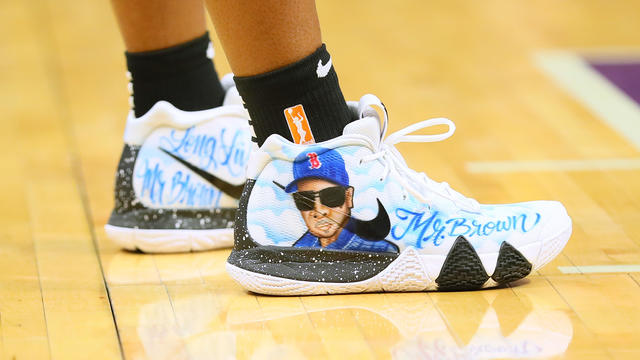Nike cracking down on people customizing its sneakers. But is it shooting itself in the foot?

Nike cracking down on people customizing its sneakers. But is it shooting itself in the foot?
Kino Hernandez and one of his close friends went into business together last year customizing sneakers and selling them online. A few weeks into the operation, his friend bailed but Hernandez decided to forge ahead. “It was about three months in and that’s when I started to get orders — and I’m not talking about local orders,” the Salem County, New Jersey, resident said. “I was getting my orders from like California and Las Vegas.”
Adding colors and designs to shoes in recent months has netted Hernandez about $10,000 in income, he estimates. For Hernandez, the shoe-customizing business lets him generate income while working part-time as well as allowing him to flex his talents as an artist — an ideal work-life balance, he said. But a lawsuit from Nike threatens that livelihood, not just for Hernandez but for countless other footwear customizers.
The suit, filed last month in California, accuses Drip Creationz — one of the largest shoe customizing companies in the world — of deconstructing Nike shoes, adding new material to them and reselling them for much more than regular retail price. That violates trademark and copyright laws, Nike lawyers said.
“Our goal is to help ensure consumers are able to buy our products that are both authentic and authorized by us and there is no confusion for consumers,” Nike said in an email to CBS MoneyWatch. “None of the items sold by Drip Creationz are authorized Nike Inc. products.”
According to one legal analyst, Nike’s complaint suggests the company plans to come after anyone who customizes its shoes, including one-man operations like Hernandez’s.
Should Nike care?
No one knows exactly when people started altering Nike shoes, but those involved in the customization world say the practice is decades old. Of course, the work isn’t exclusive to Nike shoes. Customizers work on Adidas, Vans and any other shoe brands their clients favor.
One of the top-selling athletic shoes in the U.S. is the Nike Air Force 1, according to market research firm NPD Group — the very shoe that many customizers use as their blank canvass.
“None of this is being done out of malice,” said Aron Solomon, a Montreal attorney and self-proclaimed sneakerhead, referring to the shoe customization trend. “If anything, it’s just encouraging people to buy more Nikes.”
Hernandez, one of many customizers who pay retail for Nike shoes to customize, said the athletic gear giant’s suit doesn’t concern him. “I’m not really scared of that. If they win, then I’ll just find another shoe to work on.”
A 21st century cottage industry
Most customizers are either experienced artists, fashion fanatics, savvy entrepreneurs or all three, Solomon said. “A majority of people are just one or two artists working out of their garage or basement doing one or two at a time just as a side hustle or hobby,” he told CBS MoneyWatch.
Veteran customizers have mastered the art of wiping an acrylic solution across a fresh shoe to strip away the protective coating, then dipping their brush into a specialized leather paint to recolor different parts of the shoe. For accomplished artists like Hernandez, a finished pair usually takes about 72 hours, but more intricate designs can take considerably longer.
“The longest I’ve worked on a shoe was a month,” Hernandez said, adding, “I’m a one-man factory right now.”
Some clients ask for a simple recoloring of a couple spots on the shoe, which will set them back roughly $100. But more elaborate requests can carry a price tag of $10,000 or more.
Social media has been key in fostering interest in shoe customizing, with online communities to fit every level of interest and experience. Customizers post pictures of their latest designs, often prompting passionate debate by fans, while fellow artists compare notes on technique.
New customizers rely on platforms like Facebook, Instagram and Twitter to learn where to buy the right paint, when to layer colors, how to perfect their stenciling and other practical tips. Customizers even get their job leads from social media via direct messages, Hernandez said.
Shoes “materially altered”
Customizers make money either by designing and selling a shoe online or working with clients seeking a specific design. For Nike, that’s a problem.
When someone customizes a shoe, it is “materially altered in ways neither Nike nor our partners approved or authorized,” the company said. That may involve using trademarks and branding from other companies that Nike never agreed to collaborate with.
“The more unauthorized customizations get manufactured and sold, the harder it becomes for consumers to identify authorized collaborations and authentic products,” according to Nike. “Unchecked, post-sale customization undermines our brand because we lose control of what the brand means and what our message is.”
For its part, Nike wouldn’t say if it plans to legally challenge other customizers after the Drip Creationz case is resolved. But the company has filed a second lawsuit alleging trademark infringement against former employee-turned-customizer Jeffrey Waskowiak and his company KickRich.
In May, Nike also blocked sales of MSCHF’s “Satan shoes” — modified versions of its air bubble shoes that the Brooklyn, New York, art collective produced in tandem with rapper Lil Nas X that the group describes as having “human blood in the sole.”
“Giant brand mistake”
For Nike and customizers, what’s at stake is a slice of the massive athletic footwear market, which analysts expect to reach $66 billion by 2027. Athletic shoe sales grew more than 35% in the first six months of 2021 compared with the year-ago figures, according to NPD Group.
At its core, the Nike lawsuit is about how far consumers may go under the law in altering and reselling a commercial product, Solomon said. Does the line stop at painting faces or logos on a shoe, for example, or does it extend to replacing the sole, tongue or leather? Either way, he believes “Nike is making a giant brand mistake” in pursuing the case.
In the Drip Creationz suit, Solomon said Nike could have a tough time proving the company suffered any monetary losses. And one customizer, Rasheen Dixon of Schenectady, New York, thinks Nike could hurt itself even more by winning in court.
“Nike is going to lose a lot of U.S.-based customers if they crack down on this because nobody wants to wear a Nike Air Force 1 that everyone else can have,” Dixon said.
Dixon said he started customizing shoes about three months ago and already has several clients. Orders are also starting to pick up as students prepare to go back to school, he told CBS MoneyWatch.
“Even if they do win this, we will find other brands to customize,” he said of Nike’s suit. “There’s always going to be a way for us to do what we love and make it work for us.”



